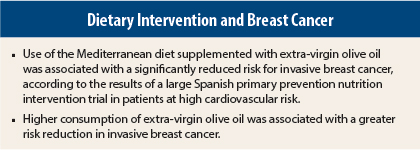As reported in JAMA Internal Medicine by Estefania Toledo, MD, MPH, PhD, and colleagues, a large Spanish primary prevention nutrition intervention trial in patients at high cardiovascular risk (PREDIMED) showed a large reduction in the risk for invasive breast cancer among women 60 to 80 years of age whose Mediterranean diet was supplemented with extra-virgin olive oil.1 Dr. Toledo and the corresponding author of this article, Miguel A. Martínez-González, MD, PhD, are both from the University of Navarra School of Medicine, in Pamplona, Navarra, Spain.
Study Details
The PREDIMED trial included 7,447 men aged 55 to 80 years or women aged 60 to 80 years (n = 4,282) with no cardiovascular disease at entry but considered to be at high cardiovascular risk. High-risk cardiovascular disease was defined as type 2 diabetes or three risk factors from among smoking, hypertension, elevated low-density lipoprotein (LDL) cholesterol, low high-density lipoprotein (HDL) cholesterol, overweight or obesity, or a family history of premature coronary heart disease.
Patients were randomized between October 2003 and June 2009 to receive a Mediterranean diet supplemented with extra-virgin olive oil, a Mediterranean diet supplemented with mixed nuts, or a control diet with advice to reduce dietary fat. Participants in the two intervention groups were given supplementary foods for free, consisting of 1 L/wk of extra-virgin olive oil for participants and their families or mixed nuts (30 g/d; 15 g of walnuts, 7.5 g of hazelnuts, and 7.5 g of almonds). At baseline and once a year during follow-up, participants were administered a validated 14-item Mediterranean diet screener, a general medical questionnaire, a 137-item validated food-frequency questionnaire, and the Minnesota Leisure-Time Physical Activity Questionnaire.
The incidence of breast cancer was a prespecified secondary outcome of the trial among women with no history of breast cancer (n = 4,152). Among these women, 1,476 received the Mediterranean diet with olive oil, 1,285 received the Mediterranean diet with nuts, and 1,391 received the control diet. The three groups were generally balanced for age (mean 67 to 68 years), smoking status (never for 87% in each), body mass index, hypertension, type 2 diabetes, dyslipidemia, family history of premature coronary heart disease or cancer, use of hormone therapy, age at menopause, and alcohol consumption.
Breast Cancer Incidence
After a median follow-up of 4.8 years, there were 35 confirmed incident cases of invasive breast cancer. Among patients with available receptor-status information, 31 of 33 had estrogen receptor–positive disease, 21 of 27 had progesterone receptor–positive disease, and 12 of 21 had HER2-positive disease.
The incidence rates were 8 of 7,031 person-years in the Mediterranean diet with extra-virgin olive oil group, 10 of 5,492 person-years in the Mediterranean diet with nuts group, and 17 of 5,829 person-years in the control group, yielding rates per 1,000 person-years of 1.1, 1.8, and 2.9, respectively. On multivariate analysis adjusting for age, study site, body mass index, waist-to-height ratio, use of hormone therapy, leisure-time physical activity, total energy intake, alcohol consumption, age at menopause, and baseline adherence to the Mediterranean diet, hazard ratios for invasive breast cancer were 0.32 (95% confidence interval [CI] = 0.13–0.79) for the Mediterranean diet with extra-virgin olive oil group and 0.59 (95% CI = 0.26–1.35) for the Mediterranean diet with nuts group compared with the control group. After excluding women with follow-up of less than 1 year (including one patient who developed breast cancer in the olive oil group, one in the nuts group, and two in the control group), hazard ratios were 0.33 (95% CI = 0.13–0.85) and 0.65 (95% CI = 0.27–1.53) vs the control group.
In analyzed subgroups, hazard ratios for the olive oil group vs the control group were similar to those in the overall population and were significant among women aged ≤ 67 years, never smokers, those with type 2 diabetes, nonusers of hormone therapy, those with no family history of cancer, and those with low baseline adherence to the Mediterranean diet.
Risk and Olive Oil Consumption
In a per-protocol analysis in the combined-study groups, participants who had higher extra-virgin olive oil consumption during follow-up had the lowest risk for breast cancer (hazard ratio = 0.18, 95% CI = 0.06–0.57, for 5th vs 1st quintile). In analysis with yearly cumulative updated dietary exposures, the hazard ratio was 0.72 (95% CI = 0.57–0.90) for each additional 5% of calories from extra-virgin olive oil.
The investigators concluded: “This is the first randomized trial finding an effect of a long-term dietary intervention on breast cancer incidence. Our results suggest a beneficial effect of a Mediterranean diet supplemented with extra-virgin olive oil in the primary prevention of breast cancer. These results come from a secondary analysis of a previous trial and are based on few incident cases and, therefore, need to be confirmed in longer-term and larger studies.” ■
Disclosure: The PREDIMED trial was supported by Instituto de Salud Carlos III and by the National Institutes of Health, Fondo de Investigación Sanitaria-Fondo Europeo de Desarrollo Regional, Consejería de Salud de la Junta de Andalucía, and Generalitat Valenciana. For full disclosures of the study authors, visit www.jama.jamanetwork.com.
Reference
1. Toledo E, Salas-Salvadó J, Donat-Vargas C, et al: Mediterranean diet and invasive breast cancer risk among women at high cardiovascular risk in the PREDIMED trial: A randomized clinical trial. JAMA Intern Med 175:1752-1760, 2015.



